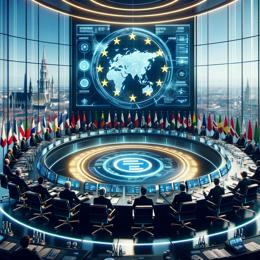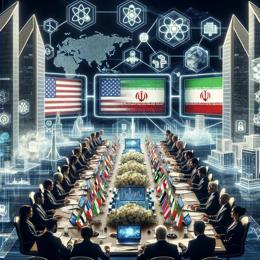Image created by AI
Groundwork Set for Special Tribunal to Try Putin for Ukraine Invasion
The European Union has taken a significant step forward in establishing a special tribunal to prosecute Russian leaders, including President Vladimir Putin, for the crime of aggression against Ukraine. This initiative aims to bring justice for the unprovoked invasion that began in 2022.
In late November 2023, the EU revealed that international lawyers and senior legal experts from multiple regions, including the European Commission, the European External Action Service, the Council of Europe (CoE), Ukraine, and representatives from 37 other states, have collaborated on the foundational aspects of the tribunal. This collaboration marks a pivotal development in the international response to Russia's military actions in Ukraine.
The designated crime of aggression targets top political and military leaders who orchestrated the invasion, separating it from war crimes or crimes against humanity, which address broader categories of illegal wartime conduct. The establishment of such a tribunal underscores a focused attempt to hold the highest levels of Russian leadership accountable.
Initially proposed by Ukraine shortly after the invasion began, the tribunal faced considerable delays due to complex legal debates, including the issue of immunity for Russian leaders while in office. Despite these challenges, the progress indicates a growing international consensus on the need for accountability.
The International Criminal Court (ICC) in The Hague has issued arrest warrants for Putin and other Russian officials concerning the deportation of Ukrainian children. However, the ICC does not have jurisdiction over the crime of aggression due to Russia's non-ratification of the ICC treaty. This lack of jurisdiction has prompted the pursuit of alternative legal avenues.
Discussions about amending the ICC’s Rome Statute at the UN General Assembly have occurred, although such amendments face significant obstacles. Therefore, the CoE has proposed hosting the new tribunal, with Secretary-General Alain Berset expressing hope that a legal framework could be finalized within the year.
Berset also highlighted the importance of support from the United States and its allies, indicating that the success of the tribunal hinges on backing from these major powers. The potential impact of U.S.-led peace talks on the tribunal remains uncertain, yet the EU and involved parties are pressing forward to establish this crucial judicial mechanism.
This development underscores a concerted effort by the international community to address the impunity observed in the context of global conflict and aggression, aiming to uphold international law and order through targeted legal actions against those at the helm of such breaches.










